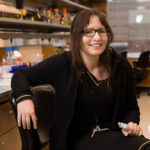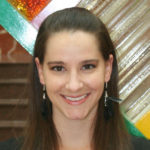About
EBRC is a non-profit, public-private partnership dedicated to bringing together an inclusive community committed to advancing engineering biology to address national and global needs. We showcase cutting-edge research in engineering biology, identify pressing challenges and opportunities in research and application, and articulate compelling research roadmaps and programs to address these challenges and opportunities. Our four focus areas, driven by member-led working groups, are Research Roadmapping, Education, Security, and Policy & International Engagement.
We’re hiring!
Want to work for EBRC? We’re currently hiring for Science Policy Postdocs and a Project Manager.
Learn More →
Steering Committee
The Steering Committee is responsible for overseeing and coordinating activities, appointing chairs of working groups and committees, and providing overall guidance on EBRC priorities, statements and community-wide efforts.
-
Kate Adamala
University of MinnesotaSecurity Chair
Full Bio →
-
India Hook-Barnard
Chief Executive Officer
Full Bio →
-
Lauren Junker
BASFInstitutional Membership Chair
Full Bio →
-
Michael Koepke
LanzaTechRoadmapping Chair
Full Bio →
-
Joshua Leonard
Northwestern UniversityAcademic Membership Chair
Full Bio →
-
Richard Murray
California Institute of TechnologyP&IE Chair
Full Bio →
-
Rebecca Nugent
Board President
Full Bio →
-
Diane Pierotti
Chief Financial Officer
Full Bio →
-
Kevin Solomon
University of DelawareBoard Member
Full Bio →
-
Mark Styczynski
Georgia Institute of TechnologyEducation Chair
Full Bio →
-
Keith Yamamoto
UCSFBoard Member
Full Bio →
Team (EBRC Staff)
We’re hiring! Learn more about our open opportunities here. The EBRC Team works from our headquarters in Emeryville, CA.
-
Elizabeth Allen
Senior Administrator
Full Bio →
-
Emily Aurand
Senior Director of Roadmapping and Education
Full Bio →
-
Garrett Dunlap
Associate Director of Policy & International Engagement
Full Bio →
-
Kaitlyn Duvall
Project and Research Associate
Full Bio →
-
India Hook-Barnard
Chief Executive Officer
Full Bio →
-
Jonathan Klonowski
Postdoctoral Researcher
Full Bio →
-
Becky Mackelprang
Director for Security Programs
Full Bio →
-
Johnathan O’Neil
Postdoctoral Researcher
Full Bio →
-
Sebastian Rivera
Postdoctoral Researcher
Full Bio →
-
Julietta Sheng
Postdoctoral Researcher
Full Bio →
-
Mary Tomagan
Senior Administrator
Full Bio →
Membership Committee
Individual Membership Committee
The Individual Membership Committee assists with the review and recruitment of Individual EBRC Members and Individual Council Members. The committee reviews applications for Individual EBRC Members on an ongoing basis and annually proposes a slate of new Individual Council Members for review and ratification by the full EBRC Council.
-
Ania-Ariadna Baetica
Drexel University
Full Bio →
-
John Glass
J. Craig Venter Institute
Full Bio →
-
Joshua Leonard
Northwestern UniversityAcademic Membership Chair
Full Bio →
-
Vincent Noireaux
University of Minnesota
Full Bio →
-
Michelle O’Malley
University of California, Santa Barbara
Full Bio →
-
Kevin Solomon
University of DelawareBoard Member
Full Bio →
Board of Directors
The Engineering Biology Research Consortium (EBRC) is a California Public Benefit Corporation exempt from income tax under 501(c)(3) of the Internal Revenue Code. It is overseen by a Board of Directors comprised of leading scientists from academia and industry. The current members of the board are Rebecca Nugent, Josh Leonard, Lauren Junker, Kevin Solomon, Keith Yamamoto, and Diane Pierotti.
History
The EBRC was founded by members of the 10-year NSF-funded Synthetic Biology Engineering Research Center (SynBERC) at the conclusion of the ERC grant period. During its 10 years of NSF support, SynBERC made important early contributions to the development of the field of synthetic biology through research from members’ labs, interactions between academic and industry members, and broad-impact activities to support socially responsible innovation. A critical limitation of SynBERC was that its membership structure limited procedures for bringing new members onboard. SynBERC launched the Affiliate PI program for junior research faculty late in the grant period as an initial effort to expand its membership. Today, EBRC has launched a holistic membership nomination process for many types of members: academic, industry, domestic, and international. EBRC membership can now stay aligned with the evolution and growth of the broader synthetic biology community and we see the addition of you as a key for doing so. Many of the key activities established by SynBERC have been adopted, improved, and continued by EBRC. EBRC is continuing to develop additional new activities and programs to support and sustain the impact of research, products, discoveries, and ideas from the synthetic biology community.
Statement of Ethics
As with many other rapidly advancing technologies, engineering biology must be considered in the context of ethical uses for personal, societal, and/or environmental advancement. Researchers should consider the diverse outcomes that may result from the knowledge and innovation they contribute to the field. The EBRC has developed a Statement of Ethics in Engineering Biology Research to guide researchers as they incorporate the consideration of long-term ethical implications of their work into every phase of the research lifecycle. Our goal is to facilitate ongoing reflection and collaboration amongst technical researchers, social scientists, policy makers, and other stakeholders to support best outcomes in engineering biology innovation and development.
Read our Ethics Statement
























